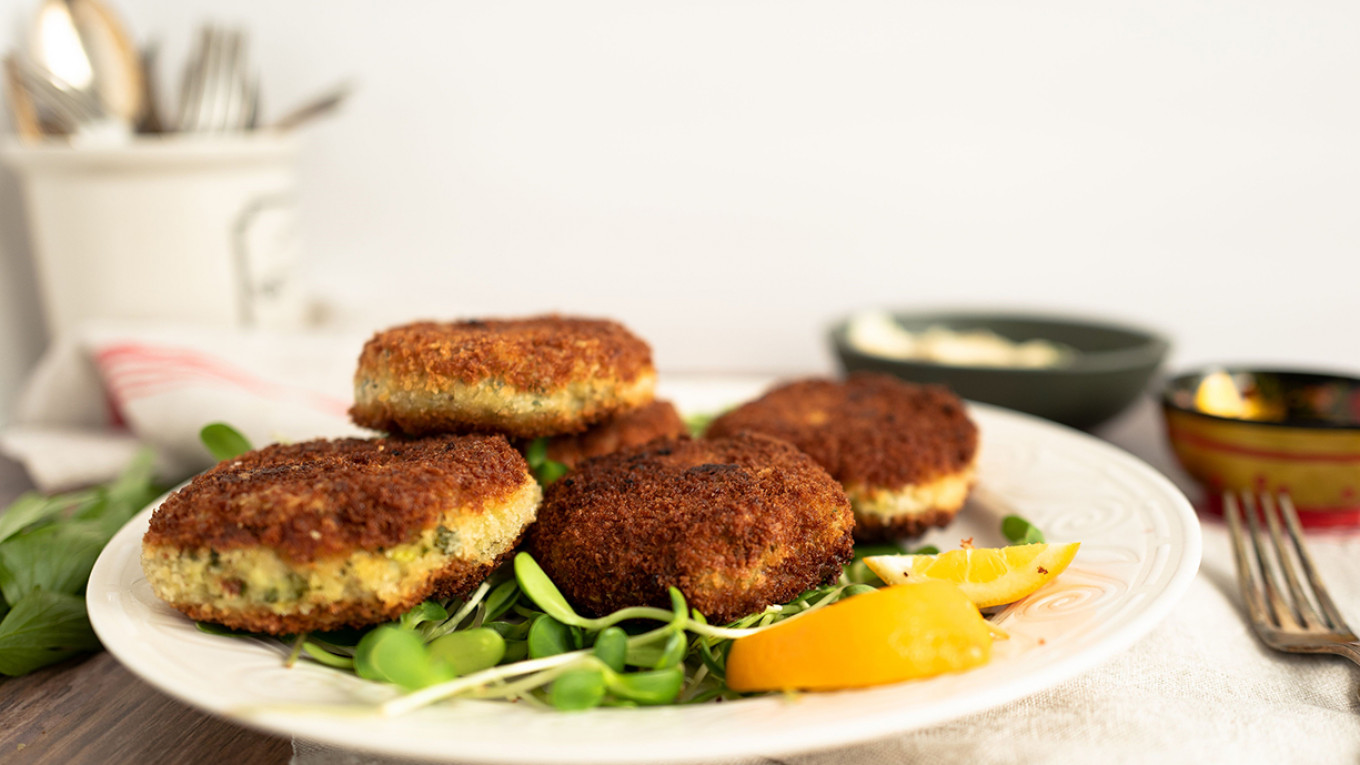When the culinary blahs plague me (an occasional hazard in my line of work) one fail-safe method of banishing them is a visit to the smoked/cured fish section of the market or grocery store. In Russia, this is both expansive and extensive, with its own distinctly potent smells. It took me several years to work up sufficient confidence to indulge my curiosity about this important food group. I struggled to understand what kinds of fish were on offer — the large glistening sides in the shop cases offered few clues. But the market vendors were helpful and generous with their samples, so by trial and error, I discovered the things I liked and those I didn’t (spoiler — I liked just about everything!).
I became a passionate convert. I believe that almost anything is improved with the addition of smoked or cured fish — well, maybe not vanilla ice cream, but just about everything else. I never emerge from a wander through these aisles and counters without new ideas and inspiration.
The size and scope of the preserved fish sections in Russia and the Baltic States is a nod to the outsized importance fish has always played in the regional diet. Besides fish from the oceans that wash the world’s largest country, there are also the mighty rivers which cleave it: the Volga, Amur, Ob-Irtysh, and the Yenisei and Lake Baikal, the world’s largest fresh-water lake and home to hundreds of unique species. Russians became adept at preserving fish to consume throughout the long winters, and after Prince Vladimir converted the country to Christianity in 988 CE, fish became an important alternative to meat during that faith’s many mandatory liturgical fasts.
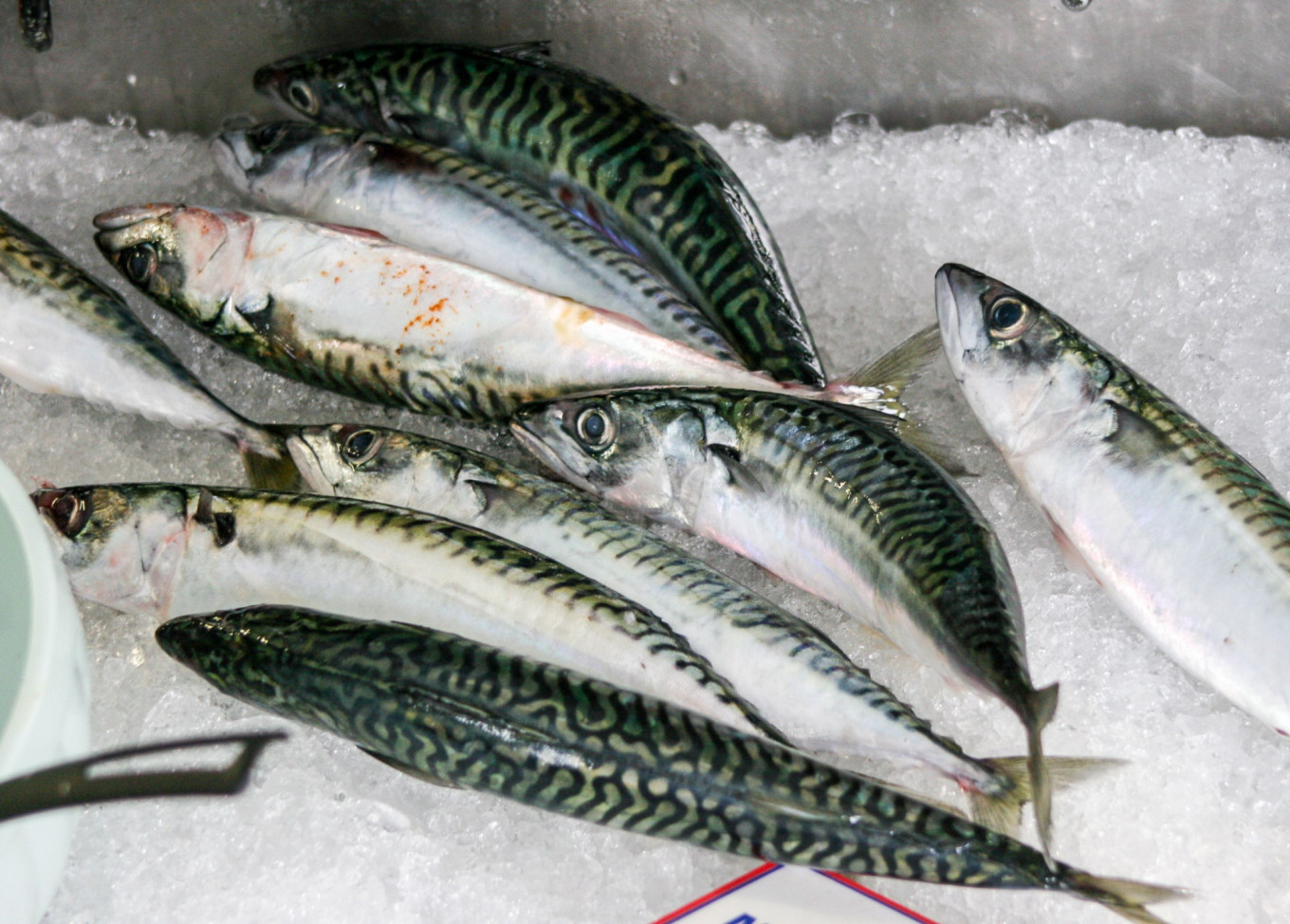
Cured fish versus smoked fish
There are several ways to preserve fish, but the primary ones are salting or curing it (соленая рыба) or smoking it (копченая рыба). I’ve written before about the ease with which you can cure fish such as salmon and smelts. Smoking fish is a more complicated and time-consuming process requiring a smoke house or grill-turned-smoker. Both versions are popular in Russia, as anyone who has ever sat down to a groaning zakuska table can attest. Once smoked, fish can be eaten on its own or used as an ingredient in other dishes, although in Russia one encounters the former more often than the latter. Russians often express surprise when served a pasta, fish pie, or salad made with, or adorned by flakes of smoked fish, but in my experience, they become instant devotees.
What kinds of fish can be smoked?
Oily fish with a high fat content such as trout, salmon, Seabass, sturgeon, mullet, whitefish, Arctic char, or my favorite, mackerel lend themselves to the smoking process because the fat protects the meat and mingles with the smoke to produce a deeper and more intense version of its original flavor. Smoked mackerel (копченая скумбрия) is popular in Russia as part of the zakuska table, though I also love to have it on rye toast with lots of dill and lemon juice for breakfast or lunch. My favorite way to use it, however, it to pair it with potatoes in savory fish cakes. If you have leftover mashed potatoes lying around, these flavorful patties come together in under 90-minutes, including the mandatory 60-minute chill. I will confess to you that I often make far more mashed potatoes than I need, just to have sufficient leftovers and streamline making these patties!
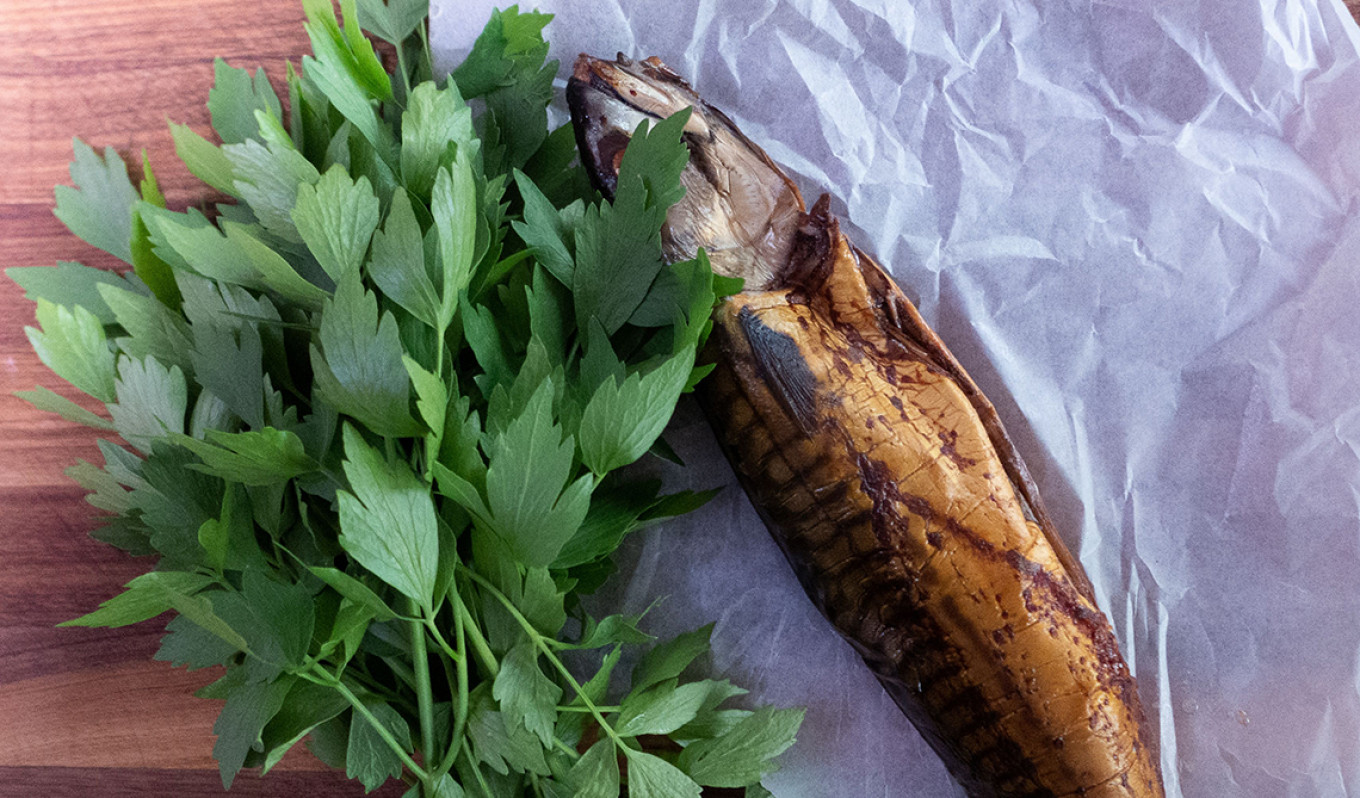
What is lovage?
When I can get ahold of fresh lovage (любисток) I always add it to the smoked mackerel fish cakes; the crisp, citrusy, and slightly anise-y flavor of this vibrant leafy-green herb is a perfect foil to the intense, almost meaty flavor of the smoked mackerel.
Lovage was another market discovery: a charming Azeri herb salesman on whom I relied for the freshest and most obscure greens, once offered me a bunch and swore on the lives of his six children that it was celery leaves. I was almost convinced, but not quite because of the distinct flavor and tubular shape of the stalks. But he had never steered me wrong before, so I took the pungent bunch home and experimented with it, then fell in love: I tossed my new obsession into salads, soups, and paired it with walnuts for an aromatic pesto. The bold, assertive flavor of lovage can overpower, but it can also make a simple bowl of greens into something really special. It also has the added virtue of being almost as easy to grow as mint, and when these two assertive greens rise from the soil, this is my clarion call to dust off the grill and shift into summer mode.
These smoked mackerel fish cakes are fabulous throughout the year, but particularly so when lovage is available. But don’t let the lovage deter you: a combination of flat Italian parsley and celery leaves will work just as well. The patties are incredibly flexible: the smoked fish elevates them from weeknight quick dinner, though they are certainly suitable for that, too. In spring, crunchy pea shoots lightly dressed in lemon juice and olive oil, or a crisp cucumber salad make an excellent side. If there are any left over, heat them up and top with a poached egg for brunch or breakfast, or simply slather them with spicy Tatar sauce and enjoy cold for lunch. You’ll find them as delicious to eat as they are easy to make.
A note on sourcing smoked fish: if you don’t live in a smoked fish hub, look for a Russian store near to you, which will always have a wide range of preserved fish. Or try an online retailer such as Russianfoods.com or Babushkadeli.uk.
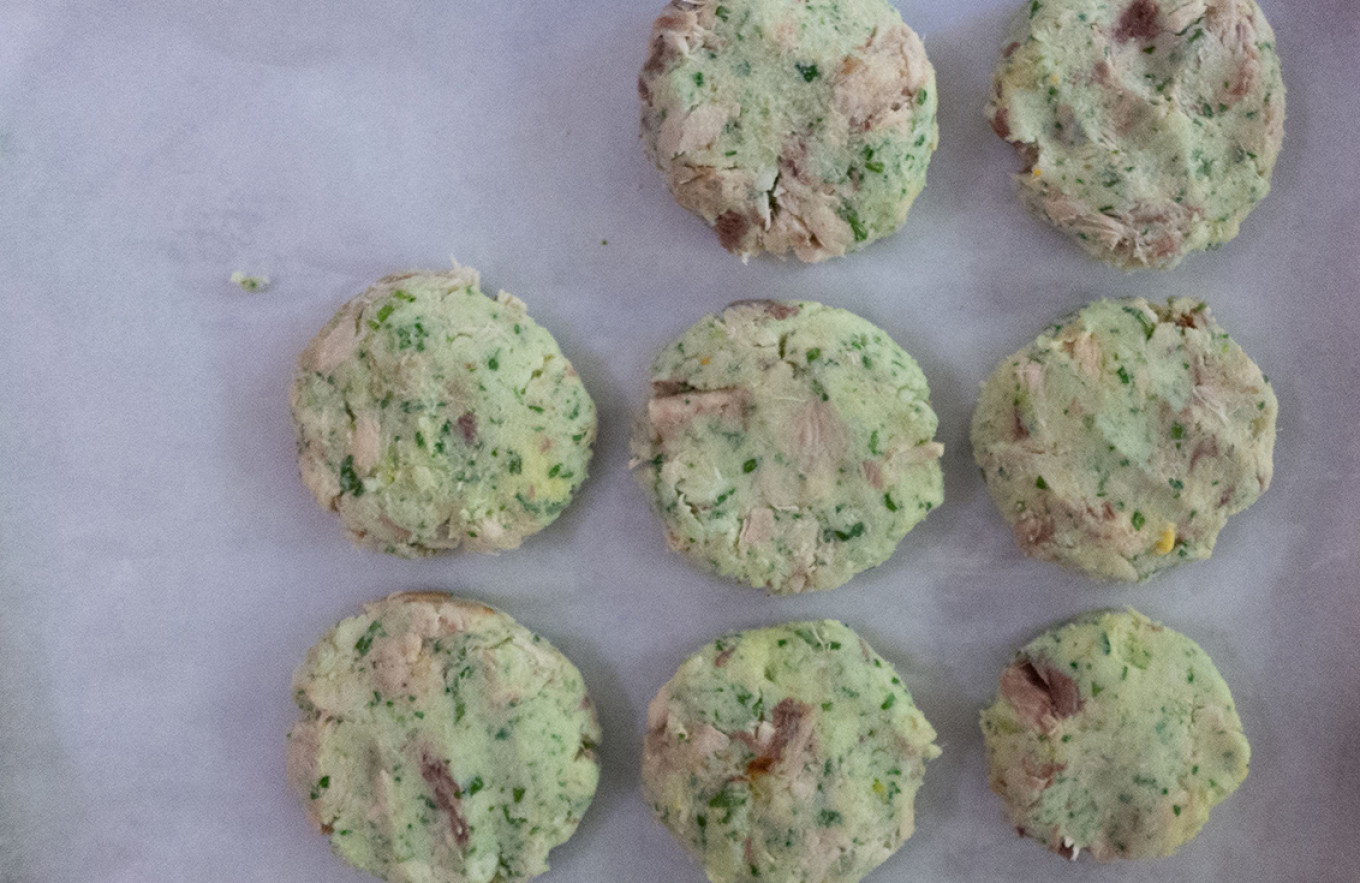
Smoked Mackerel and Lovage Fish Cakes
Yield: 9 patties. Serves 3-4
Ingredients
- 1 lb (500 grams) starchy potatoes, peeled and cut into 2-centimeter (¾-inch) chunks
- 2 Tbsp heavy cream
- 3 Tbsp butter
- ½ lb (250 grams) smoked mackerel, skin removed and gently flaked
- Zest and juice of one lemon
- ¾ cup (180 ml) chopped lovage* (stalks and leaves), washed and chopped
- 3 Tbsp prepared horseradish
- 1 tsp Aleppo pepper
- 1 tsp salt
- 1 tsp white pepper
- ⅔ cup (156 ml) ghee (clarified butter) or a high-smoke-point oil for frying
- 1 cup (240 ml) all-purpose flour
- 1 Tbsp Dijon mustard
- 1 ½ cups (350 ml) panko breadcrumbs
- 2 eggs, beaten
- Salt to taste
Spicy Tatar Sauce
- ⅔ cup (156 ml) best quality mayonnaise
- 3 Tbsp pickle brine
- 1 Tbsp capers
- 1 tsp Worcestershire sauce
- 2 Tbsp fresh lemon juice
- 2 tsp spicy sauce (if desired)
- Fresh ground pepper
- Snipped chives or scallions
*If you can’t find lovage, a combination of celery leaves and Italian flat parsley is an excellent substitute.
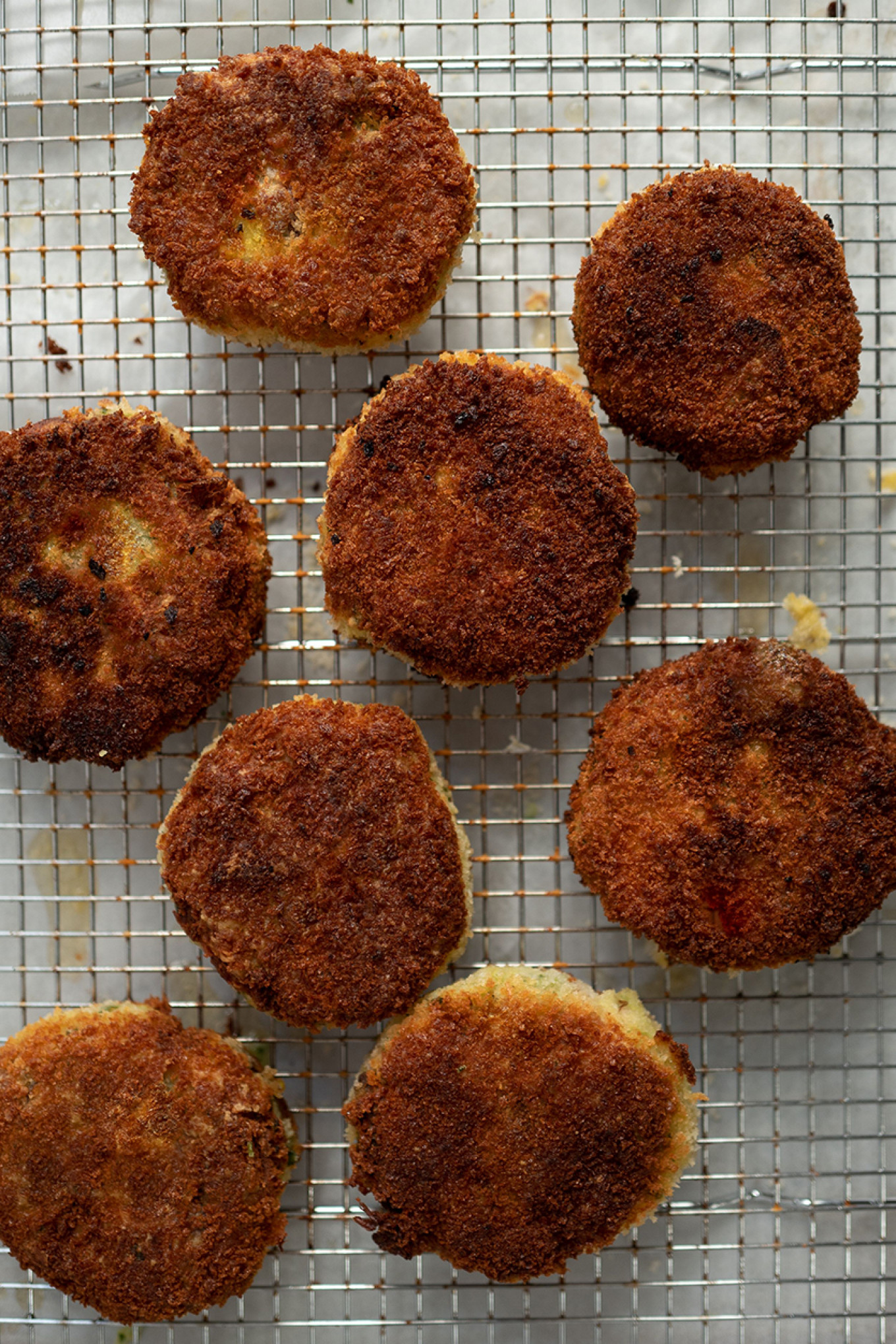
Instructions
- Boil the potatoes in a large pot of well-salted water. When they are pliant, mash them with the cream and butter, then set aside to cool to room temperature.
- When the potatoes have cooled, place them in a food processor fitted with a steel blade together with the lovage, horseradish, zest and juice of the lemon, salt and peppers. Pulse several times to loosely combine. Fold in the flaked mackerel with a rubber spatula.
- Line a baking sheet with parchment paper. Form the potato and mackerel mixture into 10-centimeter (4-inch) patties and place them on the prepared sheet. Chill for at least 1 hour.
- While the patties are chilling, make the spicy Tatar sauce by combining all the ingredients together in a food processor or a blender. Chill until ready to serve.
- Place the flour and panko into separate shallow dishes. Whisk the egg and mustard together in a third shallow dish. Dredge the patties in the flour and shake off the excess. Dip the patties into the egg mixture, then into the panko.
- Preheat the oven to 200ᵒF (93ᵒC), then place a metal cooling rack over a baking sheet. Heat the oil or melt the ghee in a large frying pan over medium high heat, then fry the patties until they are golden brown, about 4 minutes per side. Place the patties on the prepared rack and baking sheet and keep warm in the preheated oven until ready to serve.
- Serve with a generous dollop of spicy Tatar Sauce.
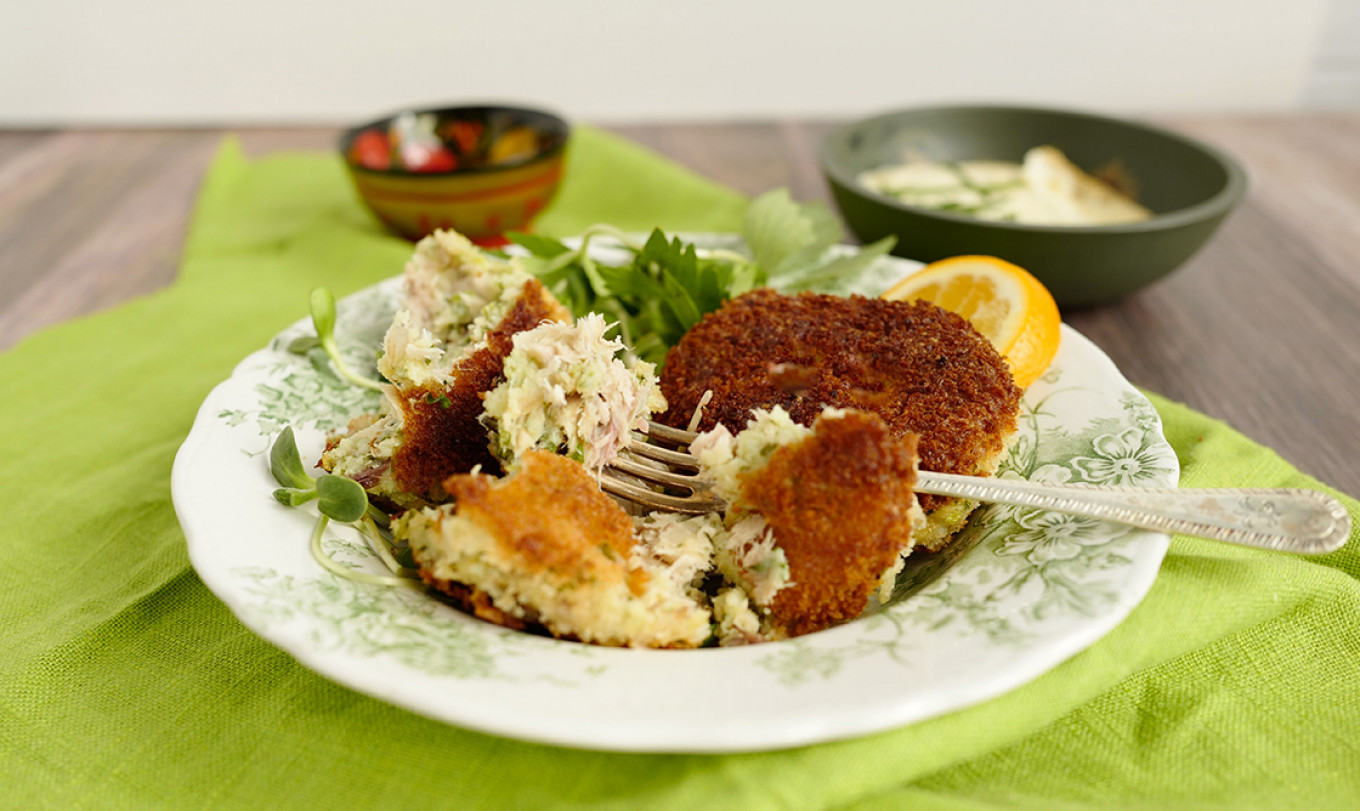
A Message from The Moscow Times:
Dear readers,
We are facing unprecedented challenges. Russia's Prosecutor General's Office has designated The Moscow Times as an "undesirable" organization, criminalizing our work and putting our staff at risk of prosecution. This follows our earlier unjust labeling as a "foreign agent."
These actions are direct attempts to silence independent journalism in Russia. The authorities claim our work "discredits the decisions of the Russian leadership." We see things differently: we strive to provide accurate, unbiased reporting on Russia.
We, the journalists of The Moscow Times, refuse to be silenced. But to continue our work, we need your help.
Your support, no matter how small, makes a world of difference. If you can, please support us monthly starting from just $2. It's quick to set up, and every contribution makes a significant impact.
By supporting The Moscow Times, you're defending open, independent journalism in the face of repression. Thank you for standing with us.
Remind me later.



